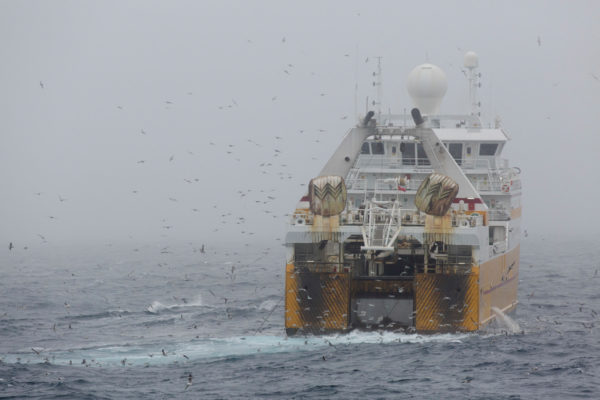Scandal-hit fishing giant is major UK quota holder
Icelandic multinational's chief executive forced to step down from UK roles amid bribery scandal over Namibian fishing rights

A director of two of the UK’s biggest fishing companies has resigned after becoming embroiled in an explosive corruption scandal in Namibia, Unearthed can reveal.
Documents released yesterday by Companies House show that Icelandic executive Thorsteinn Már Baldvinsson’s directorships of UK Fisheries Limited and Onward Fishing Company Limited were terminated on 20 November.
Until two weeks ago, Mr Baldvinsson was chief executive of the giant Icelandic fishing multinational Samherji, which owns Onward and its stake in UK Fisheries.
Onward Fishing is the fifth largest holder of English fishing quota, according to a 2018 Unearthed investigation. It also holds a 50% stake in UK Fisheries Limited, one of the top ten quota holders in the UK. Between them, these two companies control the entirety of the UK’s cod quota for the “northern external waters” around Norway and Greenland.
Samherji does whatever it takes to get its hands on the natural resources of other nations
He was forced to step down from that role “pending internal investigation” after the Icelandic media revealed serious allegations from a whistleblower about Samherji’s alleged wrongdoing in Namibia, west Africa.
Icelandic journalists reported earlier this month that the company had allegedly paid bribes of around US$10m between 2012 and 2018 to secure access to Namibian fishing quotas, and transferred proceeds from the catches to a shell company in the Marshall Islands.
The reports, which have also led to the resignations of Namibia’s fisheries minister and justice minister, are based on a huge cache of internal Samherji documents released via Wikileaks and on the allegations of Samherji’s former Namibia general manager Johannes Stefansson.
Stefansson is quoted in Icelandic and international media as saying: “Samherji does whatever it takes to get its hands on the natural resources of other nations.
“The company deceives and makes empty promises all in order to exploit these resources.
“They do not hesitate to use bribes and break the law so that they can take as much money as they can out of the country and leave nothing behind but burnt soil and money in the pockets of a corrupt political elite.”
Quota hoppers
While there is no suggestion of any wrongdoing in the way that Samherji acquired UK fishing rights, the presence of “quota hoppers” – overseas companies that have bought up UK vessels and quota – has long been controversial in the British fishing industry.
Unearthed investigations have found that Samherji’s purchases have made it one of the biggest holders of UK fishing quotas.
Until this week, the former Samherji chief executive Thorsteinn Már Baldvinsson was listed as a director of nine different UK fishing firms.
The most significant of these is UK Fisheries Limited, a 50-50 joint venture between Samherji and the Dutch multinational Parleviet & Van Der Plas, which controls two ‘distant waters’ whitefish trawlers, the Farnella and the Kirkella.
A spokesman for UK Fisheries said in a statement: “We can confirm that Thorsteinn Mar Baldvinsson has resigned from the Board of UK Fisheries.
“Mr Baldvinsson has also stepped aside from all his positions relating to our joint owner Samherji pending investigation by the international Norwegian law firm Wikborg Rein into allegations relating to Arctic Nam.
“UK Fisheries has no connection with or knowledge of these dealings and does not operate in that region.”
An Unearthed investigation last year found that UK Fisheries limited was one of the ten biggest holders of UK fishing quota. This alone places Samherji and Parleviet among the most significant of the so-called “quota hoppers”.
But even this may understate the companies’ role in UK fishing. A deeper dive into the numbers reveals that UK Fisheries holds 16% of the UK’s highly-prized cod quota units, making it the country’s biggest holder of cod quota rights.
The company controls the vast majority of UK cod quotas for the rich fishing grounds in the “distant waters” around Norway and Greenland. The remainder of the UK’s cod quotas in these waters are held by Onward Fishing, which is a wholly-owned subsidiary of Samherji.
Between them, Samherji’s wholly- or partly-owned subsidiaries control 20% of UK cod quota units, and all of the UK’s cod quota for the so-called “northern external waters”.
These fishing grounds lie outside European Union waters, and access to them by EU-flagged vessels depends on deals negotiated between the EU and Norway, Greenland and the Faroe Islands. There is a risk to the quota holders that the UK will lose access to these countries’ waters when it exits the European Union.
In response to this threat, UK Fisheries has begun a media campaign lobbying for the government to ensure its access to Norweigan waters is protected after Brexit.
The company used the media attention generated earlier this year – when its new trawler the Kirkella sailed up the Thames to be named by Princess Anne – to highlight its concerns in the press.
Many of the arguments used in the company’s “Great British Fish” campaign are explicitly nationalist, despite the fact that UK Fisheries is wholly owned by Icelandic and Dutch interests.
At the Kirkella’s naming ceremony in April, spokesman Sir Barney White-Spunner told the Times: “We already eat far too much imported fish.”
He added: “It’s a very similar argument to farming. Do we want a thriving industry? Yes we do, particularly when it’s associated with so many jobs and so much wellbeing.”
Sir Barney, a former executive chairman of the Countryside Alliance campaign group, was only appointed to his role on UK Fisheries’ “advisory board” a year ago. His role, according to a press release issued at the time, is “providing the company with strategic guidance in making the most of the opportunities offered in a post-Brexit environment”.

